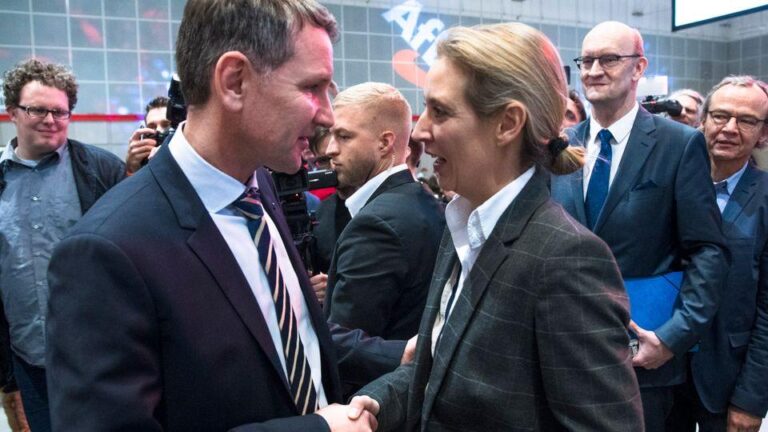For the first time, far-right populist parties have surged to the top of national polls in Germany, France, and Britain, signaling a significant shift in the political landscape of Europe’s key powers. According to recent NBC News reports, these parties are capitalizing on public discontent over immigration, economic uncertainty, and dissatisfaction with mainstream politics, raising concerns about the future of liberal democracy on the continent. This unprecedented rise marks a turning point as far-right movements gain momentum ahead of crucial elections, challenging established parties and reshaping political debates across the region.
Far Right Populists Surge to Lead Polls Across Key European Nations
The political landscape in Europe has shifted dramatically as far-right populist parties ascend to the forefront of public opinion in Germany, France, and Britain. This surge reflects growing voter dissatisfaction with traditional establishment parties, driven in part by concerns over immigration, economic instability, and national sovereignty. Analysts point to a combination of economic anxieties and cultural backlash fueling this rise, marking a significant realignment in the continent’s political dynamics.
Key factors contributing to the rise include:
- Increasing skepticism towards the European Union and its policies
- Heightened focus on border control and immigration restrictions
- Economic uncertainties exacerbated by global inflation and energy crises
- Effective use of social media platforms to mobilize grassroots support
| Country | Leading Far-Right Party | Polling Percentage |
|---|---|---|
| Germany | Alternative for Germany (AfD) | 28% |
| France | National Rally (RN) | 32% |
| Britain | Reform UK | 26% |
Analyzing the Social and Economic Drivers Behind the Shift
The surge in far-right populism across Germany, France, and Britain reflects deep-rooted social and economic anxieties now becoming impossible to ignore. Long-standing concerns over job security, immigration, and national identity have intertwined with frustrations toward globalization and perceived political elitism. This complex web of grievances has precipitated a fertile ground for parties that promise protectionism and a return to traditional values. Economic dislocation, particularly in post-industrial regions, continues to fuel skepticism about the promises of the European Union and global trade agreements, with many voters feeling left behind.
Several critical factors contribute to this political realignment:
- Rising unemployment rates in certain sectors, affecting blue-collar workers disproportionately
- Increased immigration stirring debates on cultural integration and security
- Growing urban-rural divide with rural areas expressing greater discontent
- Erosion of trust in mainstream political parties and traditional media
| Driver | Impact | Region Most Affected |
|---|---|---|
| Economic Inequality | Decline in middle-class stability | Former industrial hubs |
| Migration Concerns | Heightened social tensions | Urban outskirts |
| Political Alienation | Voter shift toward outsiders | Nationwide |
These dynamics are reshaping political landscapes in ways that challenge the established order, with voters gravitating toward populist narratives that emphasize national sovereignty and economic self-reliance. Understanding these intertwined social and economic drivers is crucial to decoding the unprecedented support for far-right parties in these historically moderate political arenas.
Strategies for Mainstream Parties to Address Populist Momentum and Rebuild Trust
In the face of rising far-right populist support across Germany, France, and Britain, mainstream parties must evolve to regain public confidence. Central to this effort is the need for transparent communication that directly addresses the economic anxieties and cultural concerns driving voters toward populist rhetoric. By fostering inclusive dialogue and demonstrating genuine attentiveness to everyday struggles, established parties can counter the narrative of elitism that fuels populism. Equally, investing in robust social programs and showcasing tangible policy results can help reclaim the trust lost to promises that populists often oversimplify.
Furthermore, revitalizing party platforms with fresh perspectives and younger leadership can signal renewal and adaptability. Emphasizing core democratic values while tackling misinformation through media literacy campaigns can weaken populists’ stronghold. Below is a brief overview of key tactical approaches mainstream parties should consider:
- Community Engagement: Hosting town halls and grassroots events to build local trust.
- Policy Innovation: Crafting bold solutions addressing immigration, economic disparity, and security.
- Coalition Building: Partnering with civil society groups to broaden appeal.
- Effective Messaging: Utilizing social media to combat populist misinformation.
| Strategy | Expected Impact |
|---|---|
| Community Engagement | Builds grassroots loyalty and counters alienation |
| Policy Innovation | Addresses core voter concerns with actionable solutions |
| In Conclusion
As far-right populist parties gain unprecedented support in Germany, France, and Britain, the political landscape across Europe faces significant shifts. Analysts warn that these rising movements could reshape national policies and challenge established mainstream parties in the coming years. As voters increasingly embrace nationalist and anti-establishment rhetoric, the future of European unity and democratic institutions hangs in a delicate balance. Observers will be closely watching upcoming elections to gauge whether this surge represents a lasting realignment or a temporary reaction to current social and economic pressures. |




